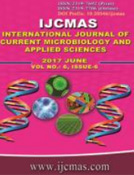


 National Academy of Agricultural Sciences (NAAS)
National Academy of Agricultural Sciences (NAAS)

|
PRINT ISSN : 2319-7692
Online ISSN : 2319-7706 Issues : 12 per year Publisher : Excellent Publishers Email : editorijcmas@gmail.com / submit@ijcmas.com Editor-in-chief: Dr.M.Prakash Index Copernicus ICV 2018: 95.39 NAAS RATING 2020: 5.38 |
The soil-borne necrotrophic fungal pathogen Fusarium oxysporum f. sp. Ciceris (FOC)infects chickpeaand causes wilt in any stage of plant from seedling to podding. Owing to climate change and ever changing nature of the pathogen, no resistant host cultivar is sustaining long against this disease. Hence, root resident Aspergillus niger isolates as native mycoflora were evaluated as bioagent against the FOC because chemical control has long been discouraged due to its circulation in food chain. In this study, we established the biocontrol potential of organic acid producing A. niger isolates under in-vitro and in-vivo conditions. All the isolates produced tryptophan, one proline, three histidine and nine hyproline and valine. The isolate1 was highly inhibitory towards the FOC under poison food technique while isolate9 was highly suppressive towards the pathogen under dual culture method. The maximum wilt reduction was recorded with isolate3 treatment that also helped the plant to retain maximum relative water content in leaves, besides maintaining higher chlorophyll content. From the results, it can be concluded that the response of bioagents under in-vitro conditions can vary under in-vivo conditions depending upon the inherent metabolite producing ability of the bioagent. This study also provides a basic knowledge about the organic acid producing A. niger isolates and their probable role in wilt management in chick pea.
 |
 |
 |
 |
 |